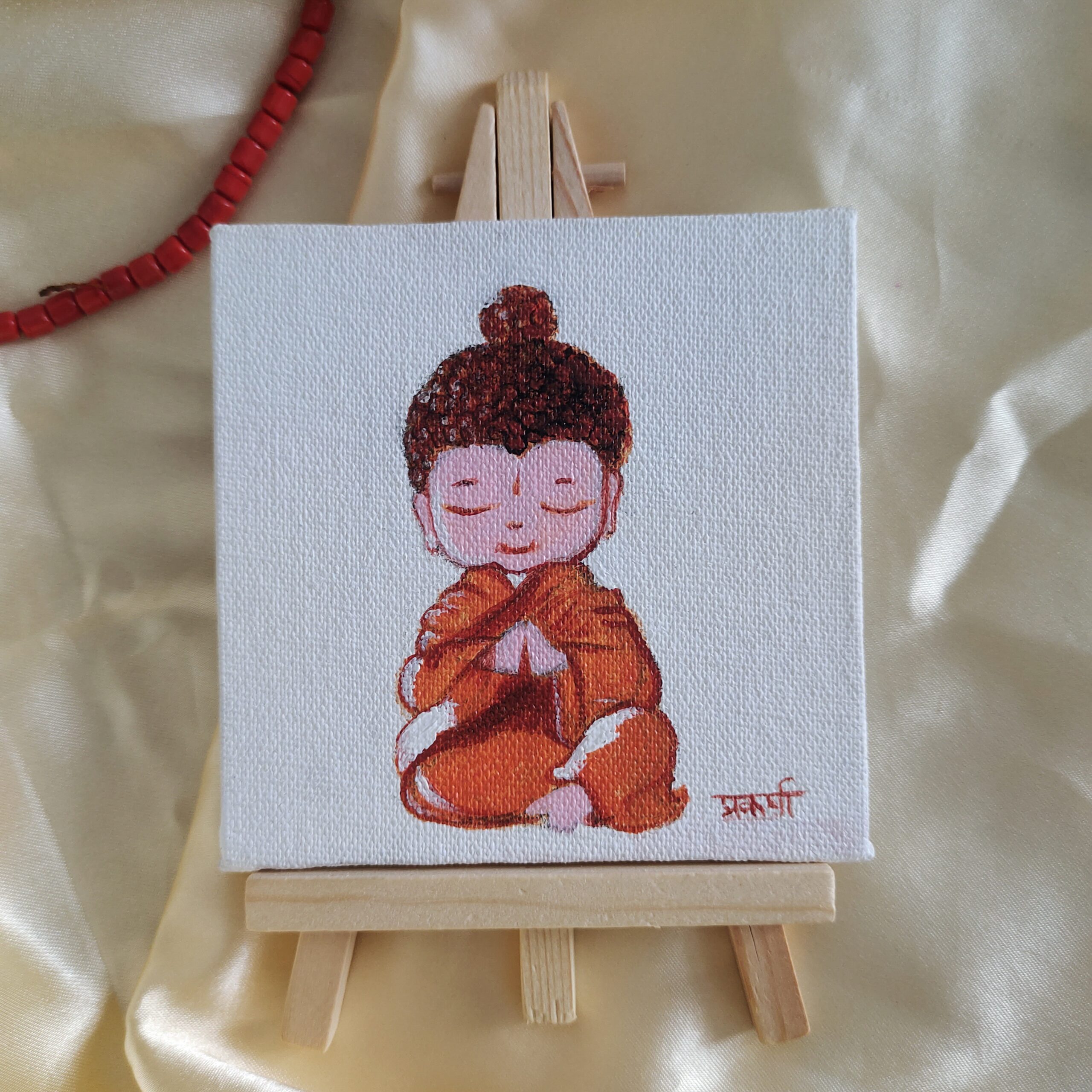Little Buddha Acrylic Mini Painting
Siddhartha Gautama, often known as Buddha, was a spiritual guide and teacher who created Buddhism. Siddhartha was born in Lumbini, Nepal, in approximately 563 BCE into a prosperous family and led an affluent, comfortable existence. But he was profoundly affected by his experiences with sorrow and his knowledge of impermanence, which set him on a spiritual path of transformation.
During trips outside of his palace, Siddhartha saw the “Four Sights”—an old man, a sick man, a corpse, and a traveling ascetic—which set off his quest for insight. He learned about the reality of age, disease, death, and the search for spiritual truth as a result of these experiences. At the age of 29, Siddhartha gave up his princely existence, leaving behind his family and his belongings, driven by compassion and a desire to comprehend the source of suffering.
Siddhartha engaged in severe asceticism for a number of years in an effort to achieve enlightenment through self-denial and meditation. He chose the Middle Way, forgoing both extreme luxury and severe austerity, because he was dissatisfied with either approaches. In Bodh Gaya, India, he sat beneath a pipal tree and made a commitment to stay there until he reached enlightenment. At the age of 35, Siddhartha underwent prolonged meditation until he attained enlightenment. This led to his transformation into the Buddha, also known as “the awakened one” or “the enlightened one.”
Buddhism is built upon the Dharma, or teachings of the Buddha. The Four Noble Truths, which sum up human existence and the way to be freed from suffering (dukkha), are fundamental to his teachings. These are the Four Noble Truths:
Dukkha, or suffering: Life is painful and unsatisfying by nature.
Samudaya (Origin of Suffering): Craving or attachment (tanha) based in ignorance (avidya) is the source of suffering.
Nirodha (Cessation of Suffering): By letting go of attachment and longing, one can achieve freedom from suffering.
Magga (Path to the Cessation of Suffering): The Noble Eightfold Path, which includes right knowledge, right intention, right speech, right action, right livelihood, right effort, right mindfulness, and right concentration, is the path that leads to the cessation of suffering.
The Noble Eightfold Path, which emphasizes morality (sila), meditation (samadhi), and wisdom (prajna), acts as a useful manual for moral and mental development.
The emphasis of Buddha’s teachings was on compassion for all living things and universal truths. By extending an invitation to individuals from diverse backgrounds to join his sangha, he founded a monastic order devoted to spiritual practice and the sharing of his teachings.
The Buddha spent much of his time teaching and propagating his message of enlightenment and peace throughout northeastern India. He conversed with individuals from diverse backgrounds, including as ascetics, philosophers, and monarchs, exhibiting a deep comprehension of human nature and life’s intricacies.
The teachings of the Buddha were first passed down orally before being collected into texts known as sutras. In order to reach Nirvana, a state of emancipation and escape from suffering, these teachings place a strong emphasis on self-awareness, mindfulness, and the cultivation of knowledge and compassion.
Buddha spent his last years teaching and mentoring his disciples before passing away in Kushinagar, India, in 483 BCE at the age of 80. His earthly journey came to an end with his death, also known as Parinirvana, yet his teachings persisted and developed throughout Asia and subsequently the rest of the globe.
The Buddha left behind a significant and enduring legacy. Buddhism has developed into a number of schools and lineages, each with its own interpretation of the Buddha’s teachings. His focus on self-reflection, moral behavior, and the quest for wisdom has inspired millions of people to pursue inner peace and spiritual fulfillment.
The Buddha, also known as Siddhartha Gautama, is honored as the creator of Buddhism and a spiritual mentor. His teachings on suffering, the way to emancipation, and the development of compassion have had a lasting impact on human philosophy and spirituality that cuts beyond historical and cultural barriers. Those looking for hidden meanings and a more comprehensive comprehension of life might still find direction and inspiration in his life and teachings.







Reviews
There are no reviews yet.